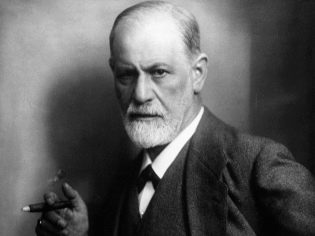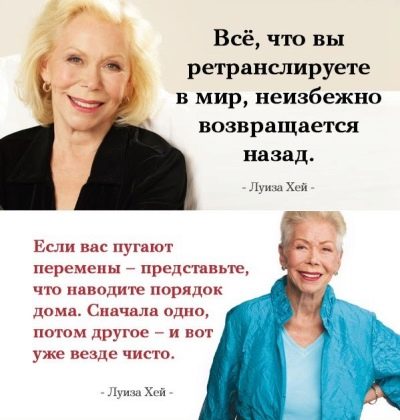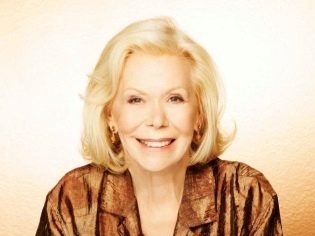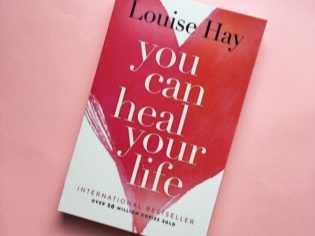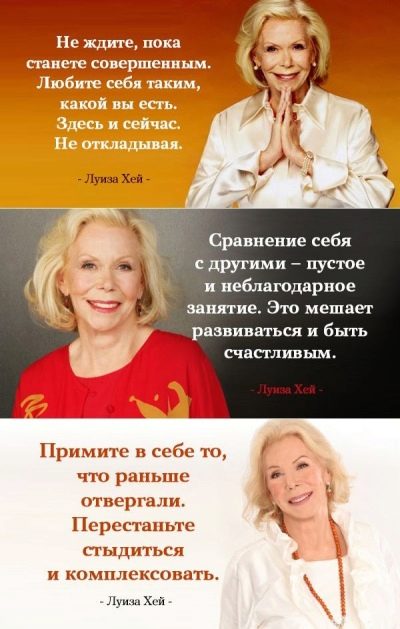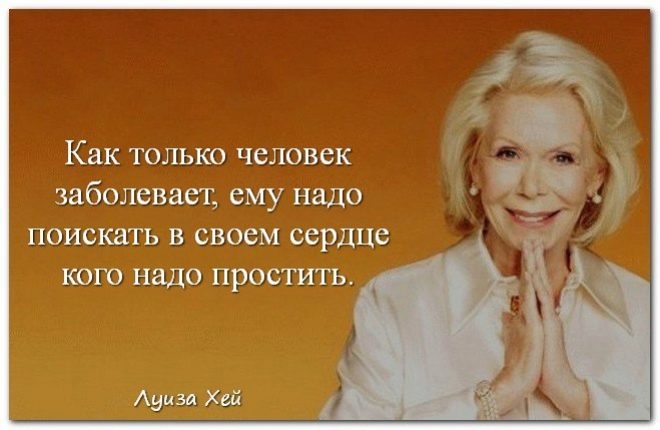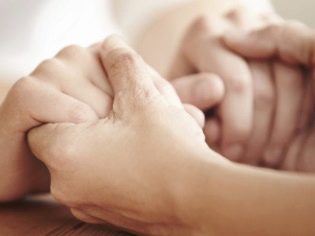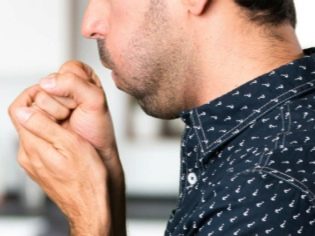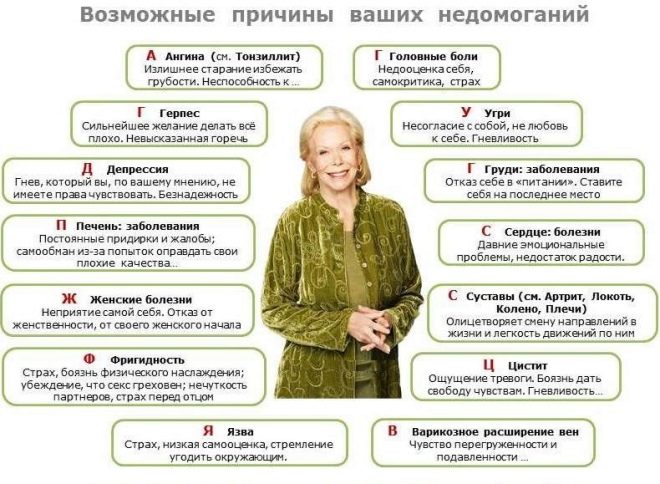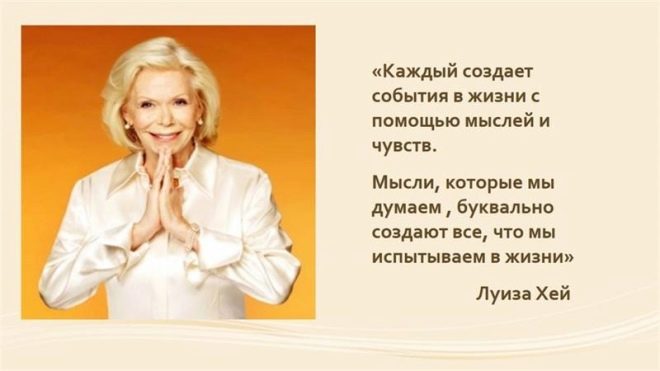Psychosomatics of Illness by Louise Hay
About psychosomatics have been known for a long time, but they started talking about it relatively recently. The idea that diseases quite often have a “starting mechanism” in the form of certain thoughts, feelings, and psychological state is not rejected by doctors of various specialties. Previously, they were forced to throw up their hands - the survey did not reveal anything, and the person is sick. Now the treatment of such a patient, who is “recorded” in the category of chronic patients for idiopathic reasons, is dealt with by specialists in the field of psychosomatics.
It should be noted that this is also an excellent self-healing system. This is what Louise Hay, one of the founders of the psychology of disease, talks about in her books.
How to find the cause of the disease according to its system, how effective it is and whether it helps, we will tell in this article.
What it is?
Even in ancient times, doctors noted that not everything that happens to the human body can be explained solely by physiology, and suggested that there is something else that binds the body to the soul and affects the state of this body. Psychosomatics is a medical direction that examines the mechanisms and causes of the development of bodily diseases depending on certain psychological factors. It explores the invisible, but very real connections between what the patient’s personality characteristics are and how they affect the course of the disease..
Many scientists and luminaries of world medicine paid attention to the fact that the soul and the body constantly interact, and positive patients recover faster and more often, and those who torment themselves with thoughts of a possible negative outcome suffer longer and more severely. Psychosomatic medicine aims to find out what causes on the psychological and emotional level could lead to the development of a particular ailment that torments a person. And knowledge of the laws of disease development, from the point of view of psychosomatics, is an excellent prevention.
Even skeptical practicing doctors are quite serious about the psychosomatic mechanisms of development of pathologies.
The history of psychosomatics comes from ancient Greece, where philosophers and doctors tried to compile the first summary of the relationship between the spirit and the bodily shell. The term was proposed in 1818 by Dr. Johann Heinroth, and after four years his work was supplemented and, in many respects, by Dr. Jacobi. In 1939, America began to publish the journal "Psychosomatic Medicine". And doctors, psychologists, psychoanalysts began to consider its fundamentals with a single goal - to create a system that would work and help cure various diseases.
Dr. Sigmund Freud, well-known to everyone and everyone, identified some psychosomatic illnesses that he himself called hysterical (with hysteria in the literal sense of the word, this is in no way connected). Freud attributed bronchial asthma, migraine and allergies to them. Later it was even proposed to include in this list stigmata — bleeding ulcers that appear on the arms and legs of some believers; they were suggested to be associated with the hypertrophied faith that enables stigma people to identify themselves with the sufferings of Christ on the cross.
In the understanding of doctors, psychosomatic illness today is a disease that actually exists, but it cannot be explained, that is, the survey did not reveal any prerequisites for the disease. They also talk about him if the correct treatment does not bring the expected result for a long time, that is, it turns out to be ineffective, despite the fact that the person regularly takes medicines, undergoes the necessary procedures.
If a person is able to create a mass of bodily problems with himself with certain thoughts and feelings, then he himself can cure himself, in any case, his body has everything necessary for this. It was this thought that the leading psychosomatic psychologist Louise Hay tried to convey to her numerous readers from around the world.
The principles of psychosomatics, which both she and many other authors support, are quite simple, and if you simplify them even more and do not overwhelm you, dear readers, with an abundance of complex psychological and medical terms, you’ll end up with a familiar expression about that "all diseases come from the nerves."
Let's look at the basic principles.
- Anxiety, fear, depressed mood, negative way of thinking create a fertile ground for the development of physical pathologies. The search for the cause and its “study”, replacement with positive thoughts and feelings lead to the disappearance of the root cause of the disease, and the person begins to recover.
- Properly defined causes accelerate recovery.
- All cells of the human body have the ability to recover, even nerve cells (partially) are considered psychosomatics. Properly running recovery process ensures improvement and gradual recovery.
Louise Hay not only managed to convey to her readers the basic psychosomatic laws, but also repeatedly checked their effect on her own organism, which ultimately explains why her theories and proposed programs are among the most popular in the world.
Dr. Louise - the way to create a system
To better understand whether the system proposed by Louise Hay is effective, it is worth asking about her life, because she came to many theses based on the events and feelings that she experienced personally. Initially, destructive events and feelings from her biography became the basis for her work.. Then she offered the system to everyone, becoming the author of more than 30 books and the founder of a charitable foundation.
She was born in 1926. The family needed, constantly led the struggle for existence. But poverty could be endured if it were not for the cruel stepfather who regularly beat little Louise and her mother and once raped a girl when she was only a little more than five years old. Barely having suffered the receipt of documents, Louise, at the age of 14, decided to run away from home. By this time, she had already abused drugs, took psychoactive drugs and led, to put it mildly, a licentious lifestyle.
The girl went to Chicago, where for the first time she tried to start a normal life, but again did not work, and in her 16 years she had already given birth to a baby, but she did not dare educate - she gave it to other people.
When she was 20 years old, she moved to New York. There, with all her might, she began to try again to lead a normal life. To survive, she had to work as a housekeeper and waitress, a salesperson. By chance, she was offered to work in the modeling business, and for this she changed her name and surname. It is possible that she could have achieved great success in her model career, but she also had to quit this job - she married a respectable, wealthy businessman. After fourteen years of marriage, the couple divorced.
With the arrival of the 70s, Louise began to study psychology. At first, she spoke to a small audience in the local church, and then gradually began to advise people on various issues, Consultation Dr. Louise enjoyed great demand. It took her several years to create her own handbook of psychosomatic diseases, because, more often than not, church psychologists often came to a state of serious illnesses.
The proposed system of new, positive thoughts and statements that can literally cure the sick, interested many, and soon Louise was invited to seminars and lectures. At first, she spoke to large audiences only in the United States, then her teaching reached the Europeans and went further.
Three years later, Louise managed to get a higher education, she graduated as a psychology teacher at the Maharishi University in Iowa.
In 1977, Louise had a real chance to experience her own teaching in: she was diagnosed with cancer. After reviewing the list of methods of treatment proposed by doctors (chemotherapy, surgery), Louise decided to treat herself. She realized that the cause of the oncological disease became offenses that had remained in the depths of her soul since childhood: she was angry with her stepfather for violence. So Louise created her famous "Forgiveness Scheme", the essence of which was to stop and completely destroy such a feeling as the old, deep resentment.
She created new thoughts, new affirmations, applied visualization methods, cleaned her body. Six months later, at a scheduled reception, Louise's doctor did not believe his eyes - there was no trace of the tumor.. It still remains unknown whether Louise actually hurt. A few years ago, the doctor who watched her then made a sensational statement to a youth publication in New York. He said that Hey never had an oncology, she simply thought that she was ill, and it turns out that she had treated the invented disease with it. Many doubted the doctor's words, since the Hay system had already managed to recruit many followers, among whom there were already very real cases of recovery from serious illnesses.
Louise returned to her native Southern California in 1980. She devoted herself entirely to research, wrote books. In 1985, she recruited a small group of six people with HIV infection and began working with them to extend their lives as much as possible (and in the long term to cure them). The group quickly grew, and instead of six people, it was already visited by 850 patients. All this happened several decades before red ribbons were worn in buttonholes as a sign of trust, support and love for those undergoing treatment.
Two years later, Louise created her own publishing house, which quickly became a large and successful company. She tried to unite the authors who are closely involved in achieving a person's happiness and health. Her publishing house printed practitioners, teachers, psychologists from around the world.
In 2005, Louise, who had already gained world renown, opened a radio station that was called “Radio for the Soul” and created a charitable foundationproviding support to women who are victims of violence, as well as HIV-infected people.
She lived a rather busy life, having understood and “rewrote” her own mistakes many times, including the mistakes of youth. For the contribution to philanthropy, the work of kindness and the propaganda of love and forgiveness was repeatedly presented to the awards of large international charitable foundations.
Louise died quietly, in a dream, she did not suffer from illnesses and until her full 90 years she looked great and always smiled at people. She died at home on August 30, 2017 at 91 years of age.
Basic principles
The principles put by Louise Hay in her psychosomatic handbook, or, as often written on the Internet, the “tables” are fairly simple, but an unprepared person will have to start to take everything for granted, to abandon the idea that someone is guilty of his troubles , failures and illnesses.
A person should take full responsibility only for himself: for his life, for his illnesses, for difficulties and problems - in a word, for his own life experience.
The remaining principles can be summarized briefly, those interested can find explanations in the books of Louise, which are translated into all languages of the world, and therefore it is very easy to find them in the public domain.
So listen carefully.
- Any thought is important. Each, even fleeting, creates the background that ultimately will shape the future.
- The past has already happened, the future is not yet obvious, so you need to live exclusively in the present day, understanding how important it is to feel here and now.
- The main mistake of all people in the world is discontent with themselves, as well as the feeling of guilt felt by a person.
- If the bad in our head is just a thought, then we need to understand that thoughts can and must be changed.
- Condemnation, resentment and guilt are the most terrible states of the soul in which the harm to human health is maximal.
- If you learn to forgive, you can beat even serious illnesses.
- If you learn to love and accept yourself, it will help to organize financial and other things, and will also help to cure existing pathologies.
- Forgiveness deserve all without exception, whatever they are to blame.
- Every available disease, every unpleasant coincidence of circumstances in which a person falls, he is obliged to himself and to no one else.
At the heart of everything, according to Louise Hay, is human thought. It is she who forms not only his behavior, but also programs the events that should happen to him, as well as underlies all the diseases known to mankind. Respectively, changing thoughts, systematically teaching yourself to think differently (new affirmations) helps to solve existing problems and avoid new ones.
To replace the old thoughts that eventually destroyed human health, you need to create new, positive ones that will start the process of that same regeneration at the cellular level, because every living organism tends to live, not die, to be healthy, not sick, and in this he just needs help.
Finding the cause of the disease
Diseases, according to Louise Hay, as well as other well-known authors of psychosomatic research, become possible in the absence of self-love, as well as in the presence of bright destructive emotions. There are not so many of them, and it is very simple to remember them; they are familiar to everyone - fear, anger, sadness (longing), resentment. From the mixture of anger and fear, jealousy is born, from the “cocktail” represented by a mixture of fear and self-dislike, depression and anxiety are born.
Talk to yourself honestly - how do you see yourself? How do you see the world around you? How is your interaction with the world? It will very quickly become clear that everything that you give to the world comes back to you, and quite quickly. If you hate your neighbors, you will receive in response not only hatred from them or someone else, but also a somatic disorder, which by its appearance is “obliged” to your original hatred.
If you tell yourself for a long time in your mind that “you can no longer see (someone or something),” then you should not be surprised that problems with the organs of sight begin, for example, a decrease in its acuity will appear.
The most devastating consequences can have such a feeling as an insult, and the longer you carry it in your soul, the more likely it is that the illness it causes will be serious, for example, an oncological disease.
Psychologists, psychotherapists, psychosomatics can help in finding the root causes. It is not always possible to honestly confess something lurking even to yourself. The tables created by Louise Hay will also help.
Using them is very simple: you need to find your diagnosis or the diagnosis of a loved one and see what thoughts or feelings could lead to an illness. Also in each case, Louise Hay gives an example of a positive affirmation, which should go to replace the existing negative setting.
The minus of these tables lies in the fact that they are rather average, they do not take into account the individuality and the characteristic features of an individual personality. And in this lies their main drawback.
If there is an opportunity, after reading the tables, it is better to still visit a psychotherapist and get a qualified rationale, as well as individual recommendations, including on correcting feelings and thoughts.
The longer the disease lasts, the more difficult it will be to cure it, because the person also does not come to the illness immediately. Destructive thoughts and emotions, wrong or aggressive attitudes accumulated for a long time before the "shoot" the disease. The process of finding the causes can also be difficult. The fact that you are on the right path will be indicated by positive changes in your state of health, in tests. You shouldn't wait for quick healing literally the next day - you have to work hard and responsible to save oneself from oneself.
Mechanisms for the development of ailments
Thought is a special form of energy. If it is not visible, then this does not mean that it does not exist. A good thought gives peace of mind, joy, peace, love for yourself and everything around you. A destructive thought destroys the connection of a person with the world around., undermines and destroys him from the inside. At the physiological level, we observe the disease when the destruction is already significant.
Do not think that only one thought can cause asthma or an attack of appendicitis. No, there is no mysticism. Everything has a logical physiological explanation. So, the thought starts the processes of work of certain parts of the brain, it causes the feelings that form the mood. The hormonal background is changing.
Let's see how this works at the level of the central nervous system.
- A negative thought appears. - there is a primary impulse from the brain to a specific muscle or muscle group.
- When a negative setting is repeated, the impulse occurs more quickly and lasts longer.
- Any negative thought is always an internal conflict, and therefore, in opposition to it, another thought arises that performs the functions of a conflicting, controlling one. The first will give impulses, and the second - to prohibit them. As a result, discoordination occurs.
Speaking of muscle, psychosomatic medicine involves not only the biceps, triceps, and other large muscles, but also small, deep, and hidden muscles of the internal organs. This little spasmarising from the appearance of bad thoughts once again, it is impossible to feel, but at the cellular level, a violation of metabolism begins to occur. If such exposure lasts a long time, the disease begins. the body that "came under attack."
Precisely according to the same scheme, processes with a reaction to the negative thoughts of the endocrine glands proceed. Strong fear or great joy accompanied by the production of the hormone adrenaline, and with anguish and depression produces norepinephrine. Stress hormones can suppress the action of sex hormones, which often leads to psychogenic infertility. Any change in hormonal levels is potentially dangerous to human health.Since the work of all organs and systems is “adjusted” by hormonal accompaniment.
The fastest of all diseases are secretive people who are used to suppress their emotions, not to show them, not tell others about them, or those who do so very rarely. Since thought is energy, according to the law of conservation of energy, in any case, it needs a way out. She will find him. And not the fact that gets in the right direction.
Of course, you can not underestimate other factors: the environmental component, a person's lifestyle, a predisposition to certain illnesses, but you should not underestimate the power of thought either. Even the conviction that thought can cripple and heal should not force people to give up conventional healing.if the doctor deems it necessary. In this case, changing your thinking style to a positive will help speed recovery.
Psychosomatics gives a fairly simple answer to the question of why some people get sick more often, while others barely get sick, although their feet are drenched and they catch viruses. Simply destructive thoughts prevail in the former, while the latter love themselves more often, forgive themselves and others more often.
Notice how many people in the usual clinic during rush hour in the queue of angry and nervous people? They are outraged by everything: the queue, the doctor’s work schedule, medicine in general, the government. They would never let themselves go without a line of someone who was late for an appointment or decided to come without an appointment. Do you think this line and circumstances make them angry? No, it is their inherent bitterness and dislike for themselves and others that cause these or other health problems, about which, in fact, have to go to the clinic.
It is important to know that negative thoughts of parents may well harm children and vice versa. Therefore, one should be attentive to diseases as such: often they are a warning to us that we are thinking wrong and doing something wrong.
If the signals of the body are not “unraveled”, the person does not pay attention to them, the problem will become more substantial.
Table of Diseases (Hey Handbook)
Disease problem | Likely causes and prerequisites | An example of positive affirmations to troubleshoot |
Adenoiditis (adenoids) | Quarrels in the family, constant disputes and confrontation. Feeling useless - in a child. | "My family is my fortress, there is no place for disputes and scandals in it." "This baby is all needed, he is welcome, beloved and beautiful." |
Alcoholism | Categorical, chronic self-acceptance of self, discontent with oneself, guilt. | “I admire myself, I love myself, I accept everything in myself. I am a valuable and necessary person. ” |
Allergy | A person does not endure someone or something. It is also characteristic of people who deny their own strength, consider themselves incapable of something. | “I have no enemies, no one makes me ill, does not harm me. I have no disagreement with this world and myself. ” |
Angina | It develops more often in people who do not know how to express emotions, closed people, as well as those who are forced to remain silent because of threats or their own fears. | “Restrictions in the past. I am free, I can manage my life myself. It's easy for me. ” |
Anemia | An acute lack of joy in life - everything is there, but in insufficient quantities. Fear of tomorrow or the unknown. | “Even the little things make me happy, I love to rejoice and with pleasure I find any occasion for this.” |
Arthritis | Strong sense of guilt for the past, excessive perception of criticism, touchiness. | “I am calm and in love with all people. I see everyone’s actions through love, I forgive everyone, including myself. ” |
Asthma | Lack of ability or desire to express accumulated inside, anger, greed, fear of the new. Children have no desire to live in this world, an unfavorable psychological situation in the house. | “I can take and let go. I am the master of my life. I easily let go and meet new. I am free". "My child is protected, he is safe, he is well." |
Arrhythmia | Disrupted rhythm of life, disagreement with oneself, the need to lead a “double life”, severe internal conflict, inability to rejoice. | “I live in complete agreement with the world. I listen to myself, respect my thoughts, myself. I enjoy everything I see. ” |
Infertility | Fear, unwillingness to take responsibility, fear of pain. Unwillingness to give birth from this partner. Mistrust. | “I believe in myself and my loved ones. I boldly look at today and tomorrow. I can handle responsible tasks. ” |
Insomnia | Guilt feelings, fears for their own well-being, increased anxiety, fear of new circumstances. | “This day was a good one. He came to an end. I leave it with love and with love I meet the new day. Everything will be fine". |
Alzheimer's disease | Unwillingness to accept reality, care of the past, into unpleasant memories. Severe resentment and anger. | “The world is full of reasons for joy. I let go of the past in peace, let it go. I accept the new with love and gratitude. ” |
Pain (of any etiology) | Fear of public condemnation, unrealized positive thoughts, guilt feelings. | “I am relaxed and free from the past. I look at the world with joy, and it gives me freedom and tranquility. ” |
Warts | Often there are people who judge others, see ugly features in others, experience petty hatred "over trifles." | “I am happy and see beautiful people around me, I myself am beautiful and attractive. I love myself and others. ” |
Bronchitis | Heavy setting at home. The stifling criticism, the stream of swearing, the rare periods of calm between scandals. | “I breathe deeply, easily and naturally. There is harmony in everything, I let her in. " |
Varicose disease (varicose veins) | Self-pity, unbearable duties, taken alone, distrust, unwillingness to share them with others, hatred for their work. | “I easily go through life and cope with affairs. I succeed, I love myself and appreciate everything that others do for me. ” |
Lice (pediculosis) | Guilt for letting others dictate terms, manipulate. Unwillingness to obey. | “I am the master of my decisions and actions. My choice is my right. I myself make important decisions. ” |
Venereal diseases | A squeamish attitude to the genitals, a sense of guilt for past mistakes on sexual grounds or in personal relationships. | “My thoughts give me joy and deliverance from guilt. I am happy, I am harmonious, I know how to love and gratefully accept the love of a partner. ” |
Viral diseases (ARVI, flu) | Dark thoughts, unwillingness to complete the work begun, laziness, disappointment, inability to rejoice. | “Joy is everywhere. It permeates me, passes through me, fills me with bright feelings. ” |
Inflammatory process | Anger, fear, resentment, desire to "flare up", repressed anger. | “I am calm and focused. I am safe, I love myself and others. ” |
Hair loss (alopecia) | Rejection of oneself, harsh criticism of oneself, lack of faith in one’s own attractiveness, deep disappointment. | "I am beautiful and attractive, I know how to like, be loved and with gratitude for everything I love myself." |
Hypertension (high blood pressure) | Self-doubt, unwillingness to listen to oneself, overload and a flurry of self-criticism, discontent with oneself, a feeling of inferiority. | “I can do any task. I handle things perfectly. I am pleased with myself, I love myself. ” |
Gastritis | Pessimism, depression, the feeling that there will never be a denouement, boring relationships, painful, pathological relationships. The lack of certainty, the feeling that nothing depends on us and all bad things are already predetermined. | “I am completely safe. Everything works out for me in the best way. I have the patience and the ability to wait. ” |
Herpes | Resentment and disappointment in loved ones who remained unspoken. Genital herpes - with inadequate treatment of sex, as to something shameful, sinful and "dirty." | “My body is beautiful, I accept it and I love it, I love loved ones, trust them and are always ready to discuss with them what excites me.” "Sex is joy, happiness, the continuation of life." |
Eye diseases | In adults, they often manifest themselves with a strong reluctance to see something or someone, for children, when they do not want to look at the world in reality (family scandals, violence, they do not pay attention to the child). | “I see the world beautiful, I see clearly and clearly, I admire its beauty and grandeur. I see every detail of this world. I am happy that I see and accept everything as it is. ” |
Deafness | Reluctance to hear criticism, withdrawal from her, stubbornness and lack of adequate self-esteem, self-esteem and cocky character, refusal to listen to advice. | “The world is beautiful in every sound.I hear them, I hear everything they want to tell me, I know how to give in, I am a great listener, I am glad about it. ” |
Dizziness | Temporary loss of goals, disappointment, change of values, loss of the feeling of "reliable leverage", the need to choose a different path, the fear of making a decision. | “I am a calm and purposeful person. I'm safe. I know exactly where I am going. I make decisions easily, they are always the right ones. ” |
Throat and his diseases | Weak throat is the lot of those who are shy or cannot open for other reasons, to tell. Creative crisis, unwillingness to change anything in oneself, stubbornness, resentment at the manipulator, repentance. | “I open my mouth and take a breath of fresh air. He is beautiful. I breathe it with pleasure, swallow it. I am open to new, I have forgiven myself. I am a new positive person. ” |
Hernia | Most often manifested in people doing not their business, this. It is also a manifestation of longing from a broken relationship. | “It's easy for me. Inside me, life flows smoothly, continuously, I feel it and calm. I love myself and everyone around me. I easily forgive those who are receding into the past. ” |
Diarrhea | Increased sensitivity, suspiciousness, dependence on public opinion, the desire to please, the rejection of events. | “I am a self-sufficient person. I accept everything that brings a new day with love and gratitude. ” |
Diabetes | Destructive thoughts about the loss of the meaning of life, grief, deep longing for what did not come true. | “I began to enjoy the world. Right now, I breathe in and feel how joy fills me. I see new goals. I easily reach them. ” |
Gallstone disease, problems with gall bladder | Severe anger, envy, resentment, a sense of injustice, a desire to do justice with their own hands at any price, hatred. | “I feel light and calm. I am happy for others, I am happy on my own, the world is harmonious, everything in it is given to everyone. ” |
Gastric diseases | The stomach most often worries those who cannot accept reality and “digest” it, the protesters, the offended. | “I easily assimilate everything new, interesting, easily assimilate my own thoughts, it is pleasant for me to easily go through life.” |
Wen | The appearance of the Wen usually occurs after long attempts to suppress disappointment in itself, as well as with the obsessive idea of danger from the outside. | “I easily let go of everything that has become past. I let it go with the world, accept the new and purify myself. I'm safe". |
Stuttering | The ban on crying, crying, the expression of emotions in childhood, strict education, the fear of expressing oneself, the fear of being misunderstood. | “I communicate easily because I love to do it. I express thoughts clearly, clearly and accessiblely. I appreciate freedom and love myself. ” |
Constipation | Unwillingness to part with the past, including negative thoughts. Fear of loss. | "I easily break free from the past, I am determined and dare, I am safe." |
Teeth | Decision symbol. If your teeth hurt - this is a sign that a person has been unable to make decisions for too long, was shy, put off the decision until later. Slander, obscene speech, curses addressed to others. | “Only accurate and correct decisions come into my life, I notice them and take them to action. I love the world around, admire him. ” |
Heartburn | Strong fear of any kind. | "I am brave, determined, I am safe." |
Stroke | A sharp denial of the meaning of life, a strong offense, an old offense, not forgiven and not forgotten | “I feel strong and brave, I see goals, forgive the past and let it go in peace. I love new ideas, gladly accept them. ” |
Impotence | Resentment at a partner, envy, hard-to-suppress anger, derogatory attitude towards the opposite sex, contempt, disrespect, obsessive desire to control everything. | "I love my partner, I appreciate and respect women, I love myself, my sexuality works." |
Cyst | Constant mental return to the negative experiences of the past, "chewing" their experiences. | “I let life flow its course. I let go of the old without offense, accept the new and forgive everything. I love me". |
Intestines and all problems with it (diarrhea, constipation, flatulence) | Fear of becoming empty, getting rid of the past. Fear of parting with old thoughts and feelings. | “I accept and digest everything that happens in life, easily and naturally. I easily get rid of the past, which has become superfluous. ” |
Skin and dermatological problems | Feeling of helplessness, powerlessness, fears. | "I protect myself with kind and strong thoughts, I am completely safe." |
Knees | High self-esteem, rejection of flexibility in decision-making, sharpness, unwillingness to find a compromise. | “I am a flexible and accommodating person. I stand firmly on my feet and easily change direction when choosing decisions. ” |
Hives | Imaginary fears and minor concerns with or without. | "I am calm, protected, I live measuredly, go through life with love." |
Overweight in women (obesity) | Dissatisfaction with oneself, a sense of danger, a desire to defend oneself, to be loved, unfulfilled dreams and difficult relationships with a partner. | “I love myself, I am beautiful, these thoughts are beginning to heal now. I am safe, I am loved. ” |
Mastopathy | Denial of their femininity, depression, painful relationship with a partner, fear for a child, for a loved one. | “I eat joy and feed it all around. I feel good and easy. ” |
Migraine | Sexual fears, panic disorders, fatigue and unwillingness to give yourself rest. Unwillingness to accept reality. | “I am relaxed. New thoughts come easily, life itself can provide me with everything I need. I trust her. ” |
Myoma | Unsolved severe internal conflicts. | "It is easy for me, I know the answers and decisions, I accept them and forgive everyone." |
Thrush | Anger at oneself, the denial of the feminine in oneself, a strong hidden insult at the partner. | “I love my every decision and I can always change it. I love my partner and myself. ” |
Heredity, hereditary diseases | Negative emotional background during pregnancy, fears and phobias, condemnation of relatives | "I accept what I have been given without reproach, with love and affection." |
Runny nose (rhinitis) | Rhinitis is a cry for help, a person “signals” that there is a hidden pain inside him, hidden from prying eyes. | "I can console myself, I love and need, I love myself." |
Legs, any pain and pathology of the lower limbs | Unwillingness, refusal to move in their life, in their development forward, unwillingness to bear responsibility. | “Everything that awaits in the future is wonderful and amazing. I boldly move forward, confidently approaching the best. ” |
Neurodermatitis | There is a strong fear of becoming a victim of crime, assault, fear of being revealed to strangers and communicating with unfamiliar people. | “The world protects me. I always feel his support. People around me want good and happiness. ” |
Gluttony (bulimia) | Attempts to fill with food a feeling of dissatisfaction with oneself, loneliness, self-pity. | “I eat the energy of good and happiness, I have enough of everything. I love me". |
Osteochondrosis and other problems of the spine | Lack of support, insecurity, self-pity, fear of deciding on something, unwillingness to take the burden of responsibility. | "Life itself supports me, everything will be fine." |
Panic attacks | Fear, self-deprecation, lack of faith in one’s own strengths and capabilities | "I am calm, I completely control the situation." |
Pancreatitis | The pancreas and its pathology are found in people who experience strong emotional bitterness because of something, cannot enjoy the moments of life. | "Life is sweet, sweet, I like to taste it to the full." |
Liver and its pathologies | The predominance of base, primitive emotions, anger. | “I am surrounded by beauty, peace and harmony. I see them and accept them. ” |
Pneumonia | Despair, fear of not coping with the situation, unwillingness or inability to express all that has accumulated. | “I breathe Life freely and freely. It fills me with joy and satisfaction. ” |
Loins and pains in her | Loss of hope, fatigue and regret about their own actions, lack of support, stubbornness. | “I stand firmly and firmly on my feet, walking easily through life.I am flexible enough to make new decisions easily. ” |
Cold | Belief in the well-established belief that people always get cold in the cold, petty offense. | "I am healthy and full of energy, I have everything in order to feel good." |
Acne | Dissatisfaction with oneself, appearance, life, people around, desire to change life, get out of an unpleasant situation. | "My thoughts are pure, my life is beautiful, I love myself." |
Psoriasis | Unwillingness to be responsible for their own negative thoughts and feelings, fear of being alone. | "I fully approve of myself, I love myself and accept only the best events and thoughts in this life." |
Heel spur | Fear to take an important step, to decide on something of great importance. | “I boldly make a new decision, easily change it if necessary, I walk smoothly and confidently through life.” |
Multiple sclerosis | Hard and inflexible thinking, inflexibility, cruelty. | “I am ready for compromise, wise and bold decisions. I feel love and gratitude. ” |
Diabetes | Disappointment, regret for unrealizable, fears | “I am grateful that it all happened that way. This is a valuable lesson that I learn with love. ” |
Heart and vessels | Lack of love, perhaps from childhood, resentment, unwillingness to forgive, a big secret that a person has to keep for many years. | “My heart is the center of me. It knocks lightly and rhythmically in the same rhythm with the rhythms of love that permeate everything around. ” |
Stomatitis | Closeness to everything new, unwillingness to let new thoughts, new attitudes, new people into life. | "I accept new things with pleasure, assimilate only good news, there are no others in my world." |
Joints | Reluctance to quickly adapt to everything new, clinging to the old, inflexibility, stubbornness, the desire to keep the past at any cost, the fear of loneliness. | "I am ready for new events, I easily accept them." |
Temperature | The recent strong attack of anger, anger. | "I am harmonious, calm, I love everyone and myself." |
Tonsillitis | The creative impulses hammered and muffled, failures, fear of condemnation. | “Everything positive is now moving within me easily and naturally. I look at my life with joy and hope. ” |
Pharyngitis | Often develops in people who are accustomed to "swallow resentment", not to defend themselves, in suspicious and anxious people. | “I am strong and protected by Life itself. All is well". |
Neck and all pathologies in this area of the spine | Suspicion, mistrust, fear of being betrayed, abandoned, unwillingness to accept someone else's point of view, stubbornness | "I accept advice with pleasure - they are wise and valuable, I need them." |
Thyroid | The fear of being offended, the feeling that the world and people are aggressive and just wait for the moment to attack. | "My immunity is strong, it is protected by my love, positive thoughts and feelings, which are a reliable shield." |
Eczema | Unwillingness to reconcile with reality, external and internal protest, nervous breakdowns. | “I'm completely safe. I am protected by love. ” |
Enuresis | Fear of loved ones, usually - parents, most often - before fathers. | "My child is safe, I am safe." |
Cervical erosion | Feeling of female failure, disappointment in a partner, in a child, in life. Reluctance to give birth, lack of pleasure from sex. | “I fill myself with tenderness and sensually perceive this world. I am beautiful, my man is beautiful, my child is beautiful. ” |
Ulcer | It develops when a person is bitten by resentment or self-deprecation. | "I love myself, I approve of all my actions." |
Barley on the eye | A man looks at the world with resentment or anger. He is unhappy, often feels ugly, does not want to see something or someone. | "I see the world beautiful, happy, myself in this world - positive and healthy." |
What to read?
It is clear that in the table we presented far from all the problems and diseases that can plague a person. There are a lot of them, and as psychosomatic medicine develops, the data are replenished and concretized.If the opinion of Louise Hay interested you, then we recommend to read her books: "Heal Yourself," "Heal Your Life."
Reviews
Reviews of the system of Louise Hay and her books are different. There are those who tried to live according to the scheme proposed by her and managed to cope with diseases, but there are those who simply read the book and did not believe it or, after several attempts to change something, refused the idea.
There are people who are categorically opposed, pointing out that Louise did not offer anything of her own and new, and writes the same common truths as most psychologists.
Many of those who were helped by the system indicate that the results were not immediately, the work on themselves took quite a lot of time, but the books still remain desktop, loved ones, to which you want to come back again and again when trouble happens or health problems begin .




